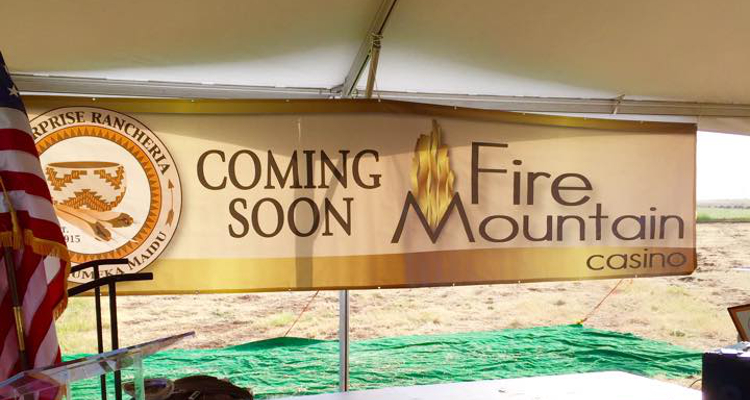Three months after holding a ground-breaking ceremony for its planned Fire Mountain Resort And Casino in northern California and the Estom Yumeka Maidu Tribe Of Enterprise Rancheria has now temporarily suspended construction on the 140,000 sq ft development as it awaits the outcome of federal decisions that will determine what type of gaming license the venue will receive.
The federally-recognized tribe stated that it hopes to open the $186 million casino project near Yuba City by May of next year while blaming the halt on difficulties in securing permanent final financing due to “14 years of unprecedented administrative delays, political and legislative interference and judicial scrutiny”.
“The continued delay-and-obstruct tactics of a small number of opponents have temporarily forced our tribe and community into this situation,” read a statement from Glenda Nelson, Chairperson for the Estom Yumeka Maidu Tribe Of Enterprise Rancheria. “We still believe that the project will go forward, that key decisions will be made any day now and that construction should take about a year once restarted; just as we did when we broke ground in April. But for right now we are forced to temporarily stop.”
Although mezzanine financing is in place for the new casino, Nelson explained that final permanent money for the construction is dependent upon the timely resolution to a “few remaining legal and administrative obstacles”.
“Nearly 15 years into the process and four years after receiving a favorable fee-to-trust decision for our land, we’re still dealing with frivolous lawsuits and misguided legislative schemes,” read the statement from Nelson. “Special interests have obstructed progress and stopped us for now from investing tens of millions more into this project and community but at a huge cost to our tribe and the local economy and job-seekers.”
One of these is the wait over whether Judge Troy Nunley from the United States District Court For The Eastern District Of California will uphold a September ruling that rejected a challenge brought by a pair of rival tribes. The Cachil DeHe Band Of Wintun Indians Of The Colusa Rancheria, which operates the Colusa Casino Resort, and the tribe behind the Thunder Valley Casino Resort, the United Auburn Indian Community, had asked that the new facility only be granted a Class II license for the operation of bingo-style games including some types of electronic and non-banked card games and filed an appeal to this decision in October.
“Delays, lost economic benefits and added project costs stemming from abusive claims and lawsuits are not the fault of the courts or government agencies,” read the statement from Nelson. “They’re doing the best they can but are simply overwhelmed just dealing with dubious tactics aimed at clogging up the system.”
Additionally, the rival tribes have asked Congress to pass legislation known as the California Compact Protection Act that would prevent the Bureau Of Indian Affairs from authorizing or allowing Class III gaming on the 40-acre site in Butte County, which was placed into trust for the Oroville tribe in 2012 as compensation for flooding caused by the construction of the Oroville Dam and the creation of Lake Oroville. However, the bill is narrowly written to protect the future gaming rights of the Cachil DeHe Band Of Wintun Indians Of The Colusa Rancheria and the United Auburn Indian Community.
“We’ve played by the rules, doing everything asked of us throughout the nearly impossible local, state and federal approval process to reclaim a fraction of our lost tribal lands for the economic betterment of our people and community as provided for under federal law,” read the statement from Nelson. “We haven’t been treated fairly by the process and the system seems broken and rigged against small players like us in favor of powerful special interests and their politician-enablers who game the system to delay progress and stifle new competitors. It’s difficult to witness the continual replay of one of the saddest chapters of American Indian history; the specter of tribe fighting tribe out of greed and ignorance. We’ll get through it, our project will get built, but it’s just tragic and unnecessary [as] there’s more than enough to go around.”


